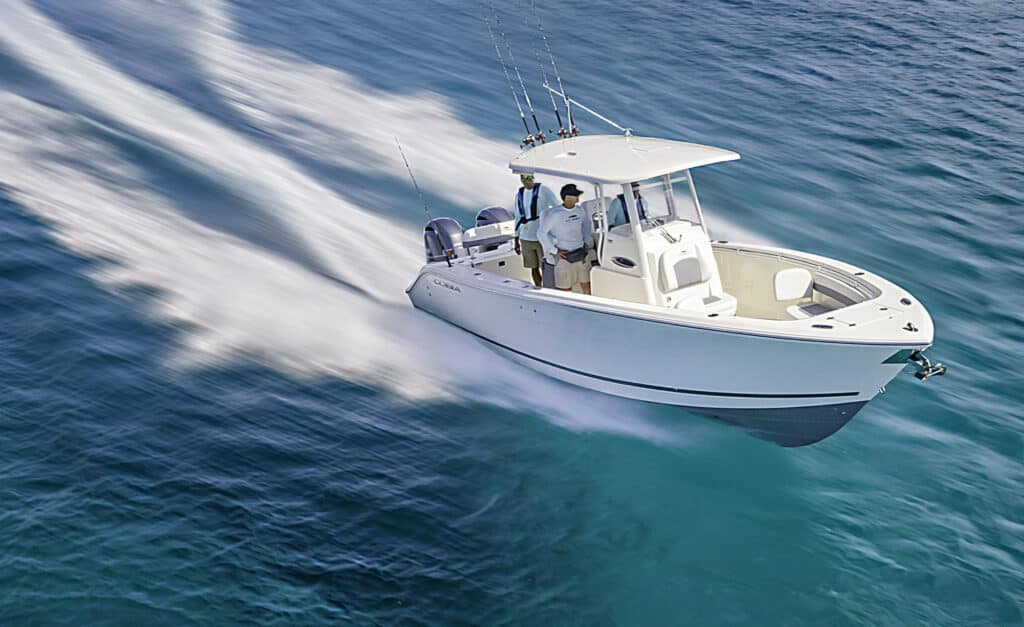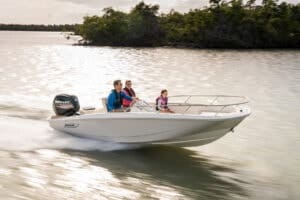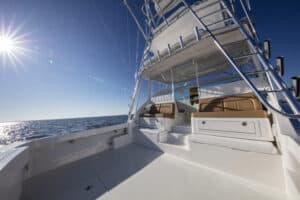Owning a boat is a goal for so many people. Belonging to that elite boat owner’s club is an achievement in itself. Boats not only serve as a status symbol but they can also serve as a source of income, a tax write off, a means of transportation, a way to explore, and a boat that can provide hours of entertainment and leisure time with friends and family members.
You can use your boat to travel to exotic destinations, island hop through the Caribbean, or explore the beautiful Mediterranean coastlines. You can also check out waterfront restaurants and get a totally different vantage point from being on the water.
When you’re ready to hop aboard your new or used boat or yacht, contact Trident Funding. They’re a leading marine financing specialist and have been helping borrowers for more than three decades. They make the entire boat loan process smooth sailing. They steer you from the initial loan application all the way until the settlement table.
You can easily apply for a boat loan online and get an approval within 24 to 48 hours. In the meantime, check out a free boat loan calculator and a free boat loan interest rate estimator. These helpful tools will tell you approximately what your monthly payment will be, as well as your total loan amount, and what your estimated interest rate will be.
Guide to Buying a Boat: What To Do and What Not To Do
Before you purchase any boat, you should complete a buying a boat checklist. Look at the service records of the boat, how many owners it has had, the number of hours on the motors, and where the boat was stored. Ask all of your questions! Find out if the boat has been in the saltwater or if it’s mainly driven in fresh water. Ask about any accidents or weather related damage to the boat. Have there been any insurance claims on or against the boat? Find out how many people the boat can safely hold and where the lifejackets and safety equipment is stored.
Take your time when making a decision about purchasing a boat. Make sure you can afford the boat and all of the additional expenses that come along with boat ownership. Buying a boat is going to be one of the biggest investments that you will ever make.
Some things to consider before buying a boat include:
- Your budget and how you’re going to pay for the boat
- The annual expenses of owning a boat including docking and storage fees
- The boat’s condition and if it needs any immediate repairs or maintenance
- How many hours are on the boat
- The cost of boat insurance
- The boat’s intended use
- The size of the boat and if it will meet your needs
- The features on the boat including a head, GPS, fish finder, and cabins etc.
Buying a Boat: The Top 5 Mistakes To Avoid
Now you know what to look for when buying a boat, you also need to know what to avoid.
Here are the top five mistakes to avoid when buying a boat:
1. Buying the Wrong Size Boat
You may not own your first boat forever but you certainly don’t want to regret the decision a few months down the line. So, carefully consider the size boat you are going to buy. If you’re deciding between a slightly bigger or a slightly smaller model, it’s usually better to go with the bigger model. It will give you room to grow into it.
Don’t choose a boat that just fits your immediate needs. If you’re a young couple and plan on having kids you may want to skip that small 23 foot jet boat and get a 27 footer instead. You don’t want to feel cramped onboard and you don’t want your guests to be uncomfortable. Make sure that your boat has ample seating areas for everyone on board so if there is inclement weather or large waves, everyone can safely sit down and hold on.
You also want to consider whether or not you will be spending the night onboard because if you plan to stay onboard overnight, you will want to purchase a larger boat such as a cabin cruiser or a yacht.
Check out the storage space as well. Some of the smaller models won’t be able to store coolers and fishing equipment as well as personal items and snorkeling gear.
So, you don’t want to choose a boat that’s too small, but the opposite is true is well, you don’t want to get a boat that is too big. If your dock can only accommodate boats under 50 feet, you don’t want to buy a 100 foot yacht. Larger boats, especially yachts may have trouble docking certain places and may need to use a tender to get guests to shore. You also need to consider if the boat is too big for you to drive, you will need to hire a captain and you may even need a crew as well.
2. Not Considering How and Where You’re Going to Use the Boat
Boats have intended uses just like cars. A race car isn’t intended for family trips and a SUV isn’t designed for the track. Keep the same thoughts in mind when it comes to boats. Fishing boats usually have deep V shaped hulls so they can cut through waves and go out in the ocean, allowing their passengers to fish from the boat.
On the other hand, pontoon boats are not intended for the ocean and are instead meant for slowly meandering around lakes or other calm bodies of water. Speed boats are fast as the name implies and cabin cruisers are larger boats that are less expensive than yachts but still have cabins which can be used to accommodate guests staying onboard overnight.
Really think about how you’re going to use the boat. Do you want to fish, use it for watersports, or just hang out in the intracoastal and chill at the sandbar? You also want to make sure the boat is designed for the type of water you plan on taking it in. Every boat isn’t designed for saltwater and in fact it may rot some hulls and deteriorate boats that are designed for freshwater.
3. Buying On Impulse
That sparkly silver pair of heels or those golf clubs you’ve been eyeing, they are fine to buy on impulse. But, buying a boat requires research. You want to know that the boat is reliable, sea worthy, a fair deal, and that it has all of the bells and whistles that you want.
You may end up buying the first boat that you see, but shop around and compare prices, and look at several boats before you purchase one. Boats are major purchases and you want to invest in one that best suits your needs.
4. Forgetting to Budget for Additional Expenses
This is very common for first time boat owners to forget about ongoing boat ownership expenses. A boat is not a one time purchase. It needs constant TLC. Once you pay the downpayment and budget for the monthly payments, make sure you have enough left over to pay for marine insurance, storage or docking fees, fuel, equipment, accessories, and cleaning.
You should also be prepared to regularly service the boat and complete all required maintenance. And repairs always pop up, so set some rainy day boat funds aside so you’re not stressed when those spark plugs need to be changed or when there’s a big rip on the upholstery on your captain’s chair.
5. Not Solidifying Boat Storage Before Your Purchase
Decide where you’re going to store your boat before you purchase it. You don’t want to buy your boat and then start looking for places to store it. Some marinas have long waiting lists and some Homeowners associations don’t allow you to park your boat outside your house.
Check out local marinas, consider wet vs dry storage and decide on where to keep your boat based on how often you plan on using it, the convenience of the storage facility, and the climate of where the boat is stored. Remember to inquire about storage fees and if they include use of electricity, water, a clubhouse, and bathrooms, etc. Also, find out the hours of the marina or storage facility. Most of them are not 24 hours so you will need to get your boat out during their business hours.
The Wrap Up: Buying a Boat
Now you know that buying a boat can be such an amazing experience and the best part is taking it out on the water to enjoy beautiful scenery, spend time outdoors, and share it with your loved ones.
However, keep your budget in mind and don’t forget that there are Always ongoing costs associated with owning a boat. Remember to properly insure the boat and learn how to safely operate it before you bring people on board. Learn from the pros to avoid the top boat buying mistakes.
Frequently Asked Questions: Buying a Boat
What is The Best Way to Buy a Boat?
The best way to buy a boat is to get pre-approved for a boat loan with a reputable marine financing specialist like Trident Funding. This way you know how much boat you can afford to buy before you waste time looking at mega yachts and your budget says you should probably stick to cabin cruisers.
Then when you know how much you’re pre-approved for, you can decide how much you want to spend. For example, you may be approved for a $300,000 boat loan but you know you only want to look at boats under $250,000.
Then it’s time to start the fun part! Boat shopping! Look online, check out options and features and see what you like and don’t like. Then goto boat shows and showrooms and get on the boat and see how the seating configuration feels and see if you like the Bimini top or if there is enough storage space. Then ask to take the boat on a sea trial if possible. This is like a test drive for a car and you can see how the boat handles in the water.
Is Buying a Boat Worth it?
The answer to is buying a boat worth it definitely depends on who you ask. If you are struggling to pay your bills or have absolutely no free time, then buying a boat probably isn’t a good idea at the moment.
However, if you enjoy being on the water, have some disposable income, and are willing to make the time to use the boat, then it’s worth it. A boat can be a good or a bad financial investment depending on a number of factors but if you enjoy it then it is a good investment for your well being and that is often the most important thing. Boats are great for de-stressing, encouraging you to spend time outdoors, disconnect, and hang out with people that matter to you.
How Much Money Do You Need to Buy a Boat?
There’s no set amount of money required to own a boat. Contrary to popular belief, you don’t need to be a multi millionaire to be a boat owner. There are plenty of reasonably priced boats for sale under $100,000 and even smaller pre-owned boats for under $50,000.
However, you do need to be able to afford to put a downpayment on the boat which is typically 10% to 30% of the boat’s price. Then you will get a boat loan to pay for the remaining balance. Keep in mind that you may also need money for closing costs, inspections, taxes, and transferring the title etc. There also may be lender fees involved and don’t forget about the annual expenses. A boat is a financial commitment with ongoing costs.
What is the Annual Cost of Owning a Boat?
There is no one size fits all annual cost of owning a boat because there are too many variables at stake. The size, year, condition, length, and location of your boat all factor into its annual ownership costs. But you should expect to spend at least 10% of the boat’s purchase price each year in annual ownership costs.
Let’s look at an example. You purchase a boat for $100,000 then you should expect to spend around $10,000 per year to own that boat. This of course varies depending on where and how you store the boat and how often you use the boat.
Annual boat costs include things like:
- Marine insurance
- Maintenance, service, and repairs
- Fuel
- Docking and storage fees
- Accessories and equipment




